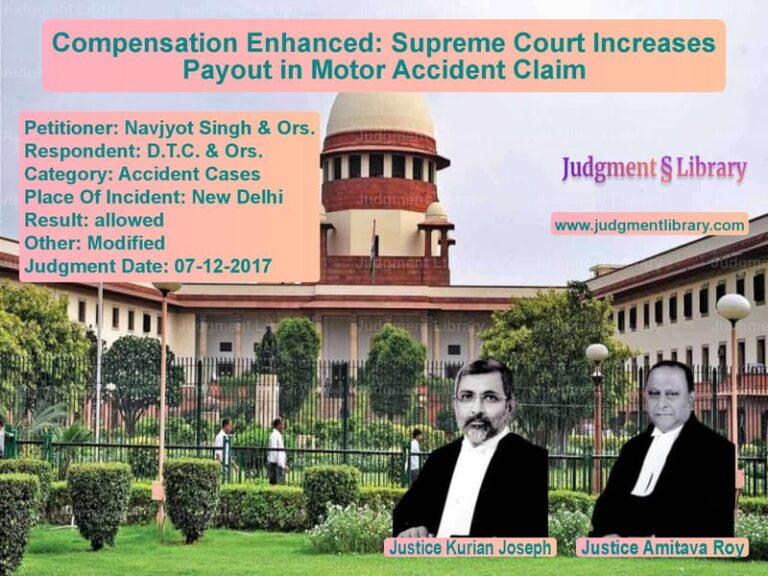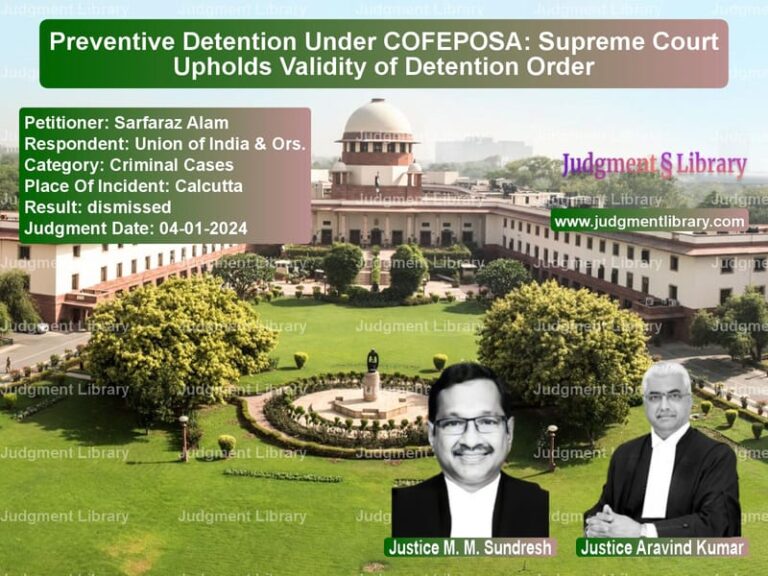Supreme Court Modifies Conviction in Murder Case: Mala Singh & Ors. vs. State of Haryana
The Supreme Court of India, in the case of Mala Singh & Ors. vs. State of Haryana, examined a crucial issue regarding the alteration of charges and convictions under Section 302 IPC (murder) read with Section 149 IPC (unlawful assembly). The Court evaluated whether the conviction of three appellants, after acquitting eight co-accused, could be legally sustained. The ruling clarified the application of Section 34 IPC (common intention) versus Section 149 IPC and whether procedural fairness was upheld.
Background of the Case
The case arose from a family dispute over ancestral agricultural land in Haryana. On September 21, 1996, a violent altercation between two groups led to the murder of Mahendro Bai. The prosecution alleged that 11 accused persons, armed with weapons, attacked the victim and others. The primary allegations were that:
- The accused were part of an unlawful assembly (Section 149 IPC).
- Mala Singh (A-7) instigated the attack.
- Mahendro Bai was killed due to injuries inflicted by members of the accused group.
The Sessions Court convicted all 11 accused under Sections 302/149 IPC, sentencing them to life imprisonment. However, on appeal, the Punjab & Haryana High Court acquitted eight accused while convicting three under Section 302 read with Section 34 IPC. This led to an appeal before the Supreme Court.
Legal Issues
The Supreme Court was asked to determine:
- Whether the High Court was justified in altering the conviction from Section 302/149 IPC to Section 302/34 IPC after acquitting eight accused.
- Whether there was sufficient evidence to sustain the conviction of the three remaining accused under Section 34 IPC.
- If the role of each accused justified their conviction or if the sentence should be modified.
Arguments of the Parties
Appellants’ Arguments
The appellants contended:
- That they were originally charged and convicted under Section 302/149 IPC, which required an unlawful assembly (five or more persons).
- Since eight co-accused were acquitted, the charge under Section 149 IPC collapsed, as an unlawful assembly no longer existed.
- The High Court could not unilaterally change the conviction to Section 34 IPC (common intention) without prior notice and opportunity to defend against this charge.
- There was no evidence to prove a premeditated plan (common intention) under Section 34 IPC.
- Each accused’s role should have been examined separately before convicting them.
State’s Arguments
The State countered:
- The evidence established that the appellants actively participated in the attack.
- The common intention to commit the crime was evident from their actions.
- The High Court was correct in altering the conviction from Section 149 IPC to Section 34 IPC based on the facts.
- There was no violation of procedural fairness as the alteration did not prejudice the appellants.
Supreme Court’s Observations
1. Collapsing of Section 149 IPC
The Supreme Court noted that Section 149 IPC requires an unlawful assembly of five or more persons. Since the High Court acquitted eight of the 11 accused, the charge under Section 149 IPC could not stand. The Court held:
“When eight co-accused were acquitted, the prosecution’s case under Section 149 IPC collapsed. The conviction under Section 302 IPC could not be sustained solely on that basis.”
2. Application of Section 34 IPC
The Court explained that Section 34 IPC (common intention) requires evidence that the accused acted together with a shared plan. The Court found:
“The prosecution failed to prove that the three appellants shared a common intention to murder the deceased. The High Court did not provide reasons for convicting them under Section 34 IPC.”
3. Individual Role of the Accused
The Court examined the role of each appellant:
- Mala Singh (A-7) had given a ‘lalkara’ (instigating call), but it was not specifically directed at killing Mahendro Bai.
- Phuman Singh (A-8) and Kashmiro (A-9) inflicted non-fatal injuries (one on the hand and another on the cheek) before others attacked the victim.
- The fatal gunshot injury was inflicted by a co-accused who had been acquitted.
4. Lack of Common Intention
The Court observed:
“No evidence was presented to show that the appellants shared a common intention to kill the victim. Mere presence at the scene does not establish guilt under Section 34 IPC.”
5. Modification of Conviction
Given the circumstances, the Supreme Court held that Phuman Singh (A-8) and Kashmiro (A-9) could be convicted only under Section 324 IPC (voluntarily causing hurt with weapons). The Court reduced their sentence to time already served and imposed a fine of Rs. 10,000 each.
Final Judgment
The Supreme Court ruled:
- The conviction under Section 302/34 IPC was set aside.
- The appellants were convicted under Section 324 IPC.
- They were sentenced to the jail time already served and fined Rs. 10,000 each.
- If the fine was not paid within three months, they would undergo an additional three months’ simple imprisonment.
Key Takeaways
- Section 149 IPC requires a group of five or more: If most co-accused are acquitted, the charge cannot be sustained.
- Section 34 IPC requires proof of common intention: Mere participation in an incident is not sufficient to invoke Section 34 IPC.
- Altering charges at the appellate stage requires caution: Courts must ensure accused persons are not prejudiced by changes in the charges.
- Role of each accused must be examined separately: The Court must assess whether each accused had a direct role in the crime.
- Convictions can be modified based on evidence: The Supreme Court reduced the conviction from murder to voluntarily causing hurt.
Conclusion
The Supreme Court’s ruling in Mala Singh & Ors. vs. State of Haryana is a landmark decision clarifying the interpretation of Section 149 IPC and Section 34 IPC. By ensuring that legal principles are applied fairly and evidence is properly assessed, the judgment strengthens due process in criminal law.
Petitioner Name: Mala Singh & Ors..Respondent Name: State of Haryana.Judgment By: Justice Abhay Manohar Sapre, Justice R. Subhash Reddy.Place Of Incident: Haryana.Judgment Date: 12-02-2019.
Don’t miss out on the full details! Download the complete judgment in PDF format below and gain valuable insights instantly!
Download Judgment: Mala Singh & Ors. vs State of Haryana Supreme Court of India Judgment Dated 12-02-2019.pdf
Direct Downlaod Judgment: Direct downlaod this Judgment
See all petitions in Murder Cases
See all petitions in Bail and Anticipatory Bail
See all petitions in Attempt to Murder Cases
See all petitions in Judgment by Abhay Manohar Sapre
See all petitions in Judgment by R. Subhash Reddy
See all petitions in partially allowed
See all petitions in Modified
See all petitions in supreme court of India judgments February 2019
See all petitions in 2019 judgments
See all posts in Criminal Cases Category
See all allowed petitions in Criminal Cases Category
See all Dismissed petitions in Criminal Cases Category
See all partially allowed petitions in Criminal Cases Category







